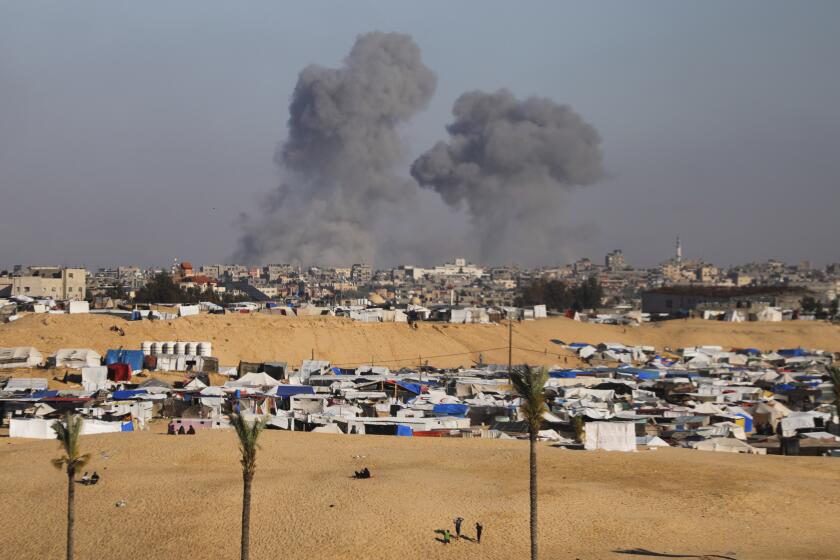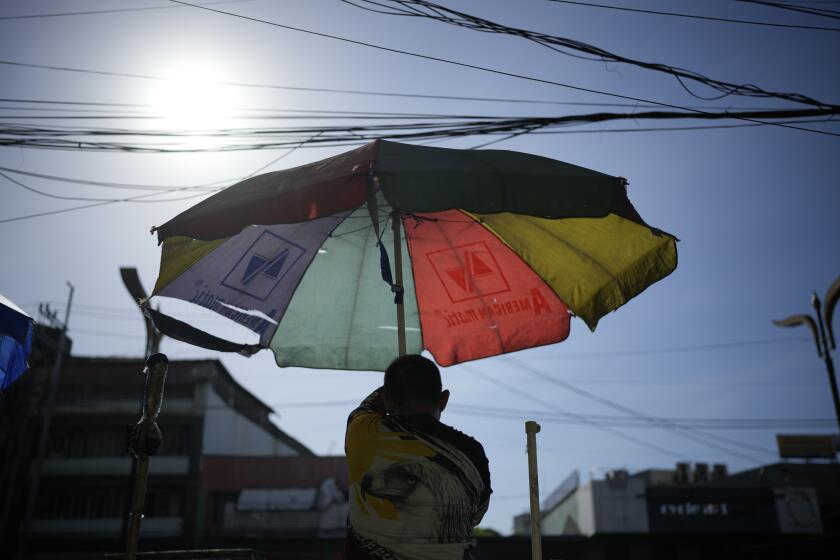After Panic, an Afternoon of Chaos
Sbarro restaurant’s buffet-style pizza and pasta and its plate-glass windows that looked out on downtown street life made it popular with families. When a Palestinian suicide bomber mingled with customers and detonated his explosives during lunch hour Thursday, the restaurant was, as usual, crowded.
The bomb, packed with screws and nails, destroyed the colorful eatery and devastated the many large families dining there. It blew out windows, tossed baby strollers into the air and threw chairs and tables onto the street as it claimed the lives of mothers, fathers, children and infants.
In the chaos that followed, parents were separated from children, sometimes reunited only after hours of frantic searching through the city’s hospitals.
The restaurant stood at the intersection of two downtown arteries, Jaffa Street and King George V, normally a vibrant avenue lined with shops and restaurants. King George stood empty for hours after the blast, except for the emergency vehicles rushing to and from local hospitals.
Outside the ruined pizzeria, thousands of tiny shards of glass--mingled with blood and pasta sauce--carpeted the asphalt.
As paramedics encased shattered corpses in black plastic body bags and stored them temporarily in a tent erected nearby, teams of ultra-Orthodox men gleaned bits of flesh from baby carriages and other items, and soaked up blood with cotton strips in a meticulous effort to ensure that every piece of human flesh was collected for burial according to Jewish law.
Anat Amar had found her four children a table with a good view, at the window that faced Jaffa Street. The bomb went off as she was cutting their pizza.
“I sat next to the big window so that my little girl could look out and see what was happening,” Amar said as she received treatment for light wounds at Jerusalem’s Shaare Zedek Medical Center. “I heard a boom. . . . I thought a light fixture had blown, everything was on fire and too bright overhead. . . . I didn’t understand.”
Her husband had warned her not to go downtown, Amar said, “but what could I do? They were tired of staying at home.”
All five of the family members suffered slight injuries. Amar’s daughter Gafnit, 5, was thrown to the floor and pinned under several chairs. Gafnit and 11-year-old Eliad were taken with their mother across town to Shaare Zedek. Nine-year-old Haggai and 7-year-old Noam were taken to nearby Bikur Cholim Hospital, where they were treated for burns and cuts.
“I saw a huge flame of fire,” Haggai said. “It threw me backward, and I found myself under the table. Then the table broke apart. . . . I understood it was a terrorist attack.” A police officer picked him and his brother up and bundled them into an ambulance, Haggai said. Hours later, Israel’s Channel 2 television linked the two by videoconference call with their mother and siblings.
The Amar family got lucky, said Bikur Cholim spokesman Alex Farkash. They all survived. Others, including a family of recent immigrants from the Netherlands, were not so fortunate. Both parents and one child were killed in the blast, and two children were seriously injured, Farkash said. He declined to give their names pending notification of family members.
The force of the explosion shook the walls at Bikur Cholim, which is only a few blocks from the restaurant. Dr. Sharon Floro, the emergency room manager, said he called Magen David Adom, Israel’s equivalent of the Red Cross, and told the agency that he believed a terrorist attack had occurred.
“We’re so used to this,” Floro said. “Every time a tire bursts or there is a sonic boom, we’re already on alert.”
Eight minutes after the blast, the emergency room had been cleared of patients in anticipation of receiving victims. Within an hour, 54 wounded had been brought in, nine of them children, he said. At least three people were dead on arrival and five seriously injured; most others suffered shrapnel cuts or shock.
For hours after the blast, dazed restaurant workers--their white uniforms stained red with blood--wandered among the crowds that milled about outside police barricades near the pizzeria. Some called relatives on cell phones to let them know they were alive; others simply sat on curbs and wept.
Because the wounded were rushed to at least four hospitals, many families were separated. Throughout the afternoon, frantic relatives rushed from hospital to hospital, searching for loved ones who they feared were dead or injured. Social workers were called in to identify victims and help people locate family members.
After nightfall, one man went on television to say that his sister, a doctor, had been killed in the blast but that the family could not find her 8-year-old daughter in any of the hospitals. He appealed for help from the public in finding her. The girl was later found dead at the Abu Kbir Institute, the national morgue.
At Hadassah Ein Kerem hospital, a 2-year-old girl arrived with no adult and no identification. She was unable to tell hospital workers who she was. It took hours for her grandparents to find her and longer still for them to discover that her mother, critically injured in the attack, was at a different hospital.
Yigal Malka, 21, a worker at a photography store next to the pizzeria, suffered minor cuts when the bomb went off. But the emotional scars, he said, will last a lifetime.
“There was a murderous blast,” Malka said. “There was lots of blood, bodies everywhere. The cashier from the pizzeria came in screaming: ‘Maytal is dead! Maytal is dead!’
“I saw a 3-year-old girl lying dead with a piece of pizza on her chest, a single bite out of it. That picture will remain with me until I am just like her, under the ground.”
*
Aron Heller of The Times’ Jerusalem Bureau contributed to this report.
More to Read
Start your day right
Sign up for Essential California for news, features and recommendations from the L.A. Times and beyond in your inbox six days a week.
You may occasionally receive promotional content from the Los Angeles Times.






